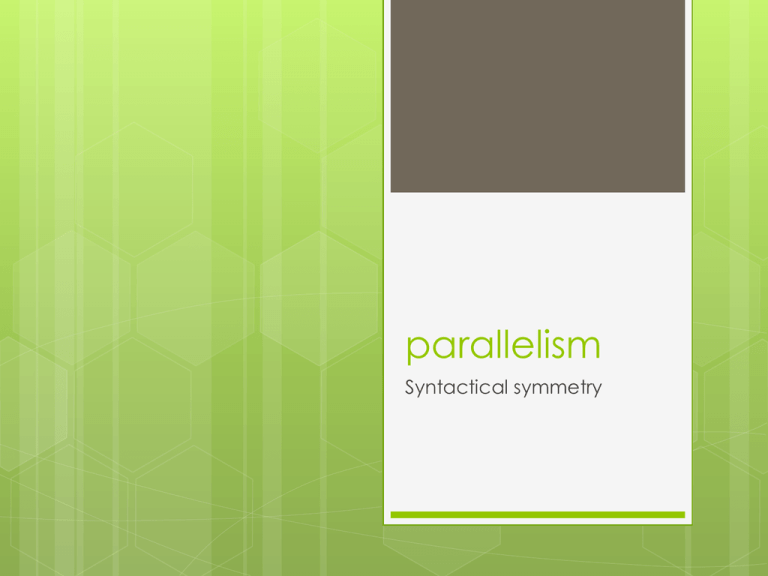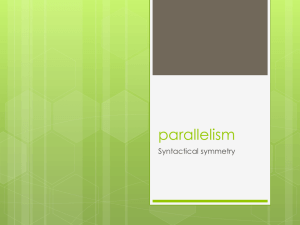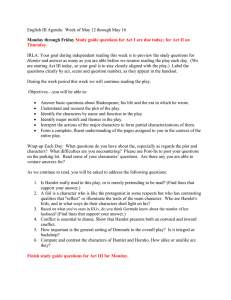parallelism
advertisement

parallelism Syntactical symmetry Parallelism is recurrent syntactical similarity. Several parts of a sentence or several sentences are expressed similarly to show that the ideas in the parts or sentences are equal in importance. Parallelism also adds balance and rhythm and, most importantly, clarity to the sentence. Parallelism- so many options Any sentence elements can be paralleled, any number of times (though, of course, excess quickly becomes ridiculous). parallel subjects with parallel modifiers attached to them: Ferocious dragons breathing fire and wicked sorcerers casting spells do their harm by night in the forest of Darkness. parallel verbs and adverbs: I have always sought but seldom obtained a parking space near the door. Quickly and happily he walked around the corner to buy the book. parallel verbs and direct objects: He liked to eat watermelon and to avoid grapefruit. just the objects: This wealthy car collector owns three pastel Cadillacs, two gold Rolls Royces, and ten assorted Mercedes. parallel prepositional phrases: He found it difficult to vote for an ideal truth but against his own self interest. The pilot walked down the aisle, through the door, and into the cockpit, singing "I’m leaving, on a jet plane." paralleling rather long subordinate clauses helps hold the sentence clearly in your head These critics--who point out the beauties of style and ideas, who discover the faults of false constructions, and who discuss the application of the rules--usually help a lot in engendering an understanding of the writer's essay. When, at the conclusion of a prolonged episode of agonizing thought, you decide to buy this car; when, after a hundred frantic sessions of begging stone faced bankers for the money, you can obtain sufficient funds; and when, after two more years of impatience and frustration, you finally get a driver's license, then come see me and we will talk about a deal. parallel participle, infinitive, and gerund phrases: He left the engine on, idling erratically and heating rapidly. To think accurately and to write precisely are interrelated goals. She liked sneaking up to Tim and putting ice down his back, because he was so cool about it. The parallelism, while it normally should be pretty close, does not have to be exact in its syntactical similarity. He ran up to the bookshelves, grabbed a chair standing nearby, stepped painfully on his tiptoes, and pulled the fifty-pound volume on top of him, crushing his ribs and impressing him with the power of knowledge. Identify the parallel structure in the sentence below: "We hold these truths to be self-evident, that all men are created equal, that they are endowed by their Creator with certain unalienable rights, that among these are Life, Liberty and the pursuit of Happiness." (The Declaration of Independence, 1776) Identify the parallel structure in the sentence below: "With malice toward none, with charity for all, with firmness in the right as God gives us to see the right, let us strive on to finish the work we are in, to bind up the nation's wounds, to care for him who shall have borne the battle and for his widow and his orphan, to do all which may achieve and cherish a just and lasting peace among ourselves and with all nations." (Abraham Lincoln, Second Inaugural Address, 1865) Identify the parallel structure in the sentence below: "This great Nation will endure as it has endured, will revive, and will prosper. So, first of all, let me assert my firm belief that the only thing we have to fear is fear itself - nameless, unreasoning, unjustified terror which paralyzes needed efforts to convert retreat into advance." (Franklin D. Roosevelt, First Inaugural Address) Rewrite the following examples so they show better parallel structure. "I require three things in a man. He must be handsome, ruthless to others, and show stupidity." (Dorothy Parker) "You are talking to a man who has laughed at death, sneers while in doom, and is chuckling during catastrophe." (The Wizard in The Wizard of Oz, 1939) "Tell me and I might forget. If you teach me I remember. Involve me and I can learn." (Benjamin Franklin) "Be sincere, use brevity, sit." (Franklin D. Roosevelt's advice to speakers) "Eye it, test it out, make the purchase." (Slogan for Chevrolet, 1940s) Here’s a few more: "What a time we had: splashed through bogs, ate as if we were pigs, and then we slept like logs." (Holling Vincoeur, Northern Exposure) "The key to Springfield has always been Elm Street. The Greeks knew it. The Carthaginians also understood it. Now you are aware too." (Herman, "Bart the General," The Simpsons) "I think we've all arrived at a very special place. As spiritual beings, ecumenically, and in grammar." (Jack Sparrow, Pirates of the Caribbean) Check your work "I require three things in a man. He must be handsome, ruthless, and stupid." (Dorothy Parker) "You are talking to a man who has laughed at death, sneered at doom, and chuckled at catastrophe." (The Wizard in The Wizard of Oz, 1939) "Tell me and I forget. Teach me and I remember. Involve me and I learn." (Benjamin Franklin) "Be sincere, be brief, be seated." (Franklin D. Roosevelt's advice to speakers) "Eye it, try it, buy it." (Slogan for Chevrolet, 1940s) "What a time we had: splashed through bogs, ate like hogs, slept like logs." (Holling Vincoeur, Northern Exposure) "The key to Springfield has always been Elm Street. The Greeks knew it. The Carthaginians knew it. Now you know it." (Herman, "Bart the General," The Simpsons) "I think we've all arrived at a very special place. Spiritually, ecumenically, grammatically." (Jack Sparrow, Pirates of the Caribbean) Advanced Forms of Parallelism Anaphora: repetition of the same word group or group of words at the beginning of successive clauses Example: “We shall go to the end, we shall fight in France, we shall fight in the seas and oceans…” Winston Churchill Asyndeton o Deliberate omission of conjunctions in a series of related clauses o Example: “Speed up the film, Montag! Quick! Click! Pop! Look! Eye! Now!....”Ray Bradbury Fairenheit 451 Antimetabole A sentence strategy (a form of chiasmus) in which the arrangement of ideas in the second clause is a reversal of the first. The same words are used BUT in reversed order. The direct object of the subject is reversed. This is not the case in chiasmus. Example: “We didn’t land on Plymouth Rock, Plymouth Rock landed on us.” – Malcom X Polysyndeton Deliberate use of many conjunctions for special emphasis- to highlight quantity or mass of detail or to create a flowing, continuous sentence pattern. Example: “He pulled the blue plastic tarp off him and folded it and carried it out to the grocery cart and packed it and came back.” Cormac McCarthy The Road Stichomythia Dialogue in which the endings and beginnings of each line echo each other, taking on a new meaning with each new line Example: QUEEN: Hamlet, thou hast thy father much offended. HAMLET: Mother, you have my father much offended. QUEEN: Come, come, you answer with an idle tongue. HAMLET: Go, go, you question with a wicked tongue. Zeugma The use of a verb that has two different meanings with objects that complement both meanings. Example: She lost her temper and her keys. Antithesis The juxtaposition of sharply contrasting ideas in balanced or parallel words, phrases, grammatical structure or ideas. Example: Love is an idea thing, marriage is a real thing. Chiasmus The order of modifiers, terms or simply sentence structure in the first half of a parallel clause is reversed in the second. Example: “In the end the true test is not the speeches a president delivers, it’s whether the president delivers on the speeches.” Hillary Clinton Isocolon Parallel structure in which the parallel elements are similar not only in grammatical structure but also in length. Example: “I’m a Pepper, she’s a Pepper, We’re a Pepper. Wouldn’t you like to be a Pepper too? – Dr. Pepper commercial circa 1980 something Ephanalepsis Repeats the beginning word of a clause or sentence at the end. The beginning and end are two positions of strongest emphasis, so special attention is called by having the same word in both places. Example: “The man who did the walking busy the man who was sleeping a drink, the man who was sleeping drinks it while listening to a proposition from the man who did the walking.” Jack Sparrow Pirates of the Caribbean Practice: Identify the type of parallelism in each sentence. 1. From The Bible: “Many are called, but few are chosen.” 2. We shall fight on the beaches, we shall fight on the landing-grounds, we shall fight in the fields and in the streets, we shall fight in the hills. (Winston Churchill). 3. “To err is human, to forgive divine” – Alexander Pope 4. “He thinks I am a fool. A fool, perhaps I am” And a few more…. 5. Hamlet: Now mother, what’s the matter? Queen: Hamlet, thou hast thy father much offended. Hamlet: Mother, you have my father much offended Queen: Come, come, you answer with an idle tongue Hamlet: Go, go you question with a wicked tongue. 6. “He stole both her car and her heart that fateful night.” 7. “The meal was huge: my mother fixed okra and green beans and ham and apple pie and green pickled tomatoes and ambrosia salad and all manner of fine country food—but no matter how I tried, I could not consume it to her satisfaction.” Wait, we’re not done! 8. “Ask not what your country can do for you; ask what you can do for your country.” (JFK) 9. “I came, I saw, I conquered.” (Julius Caesar) 10. To report that your committee is still investigating the matter is to tell me that you have nothing to report.




